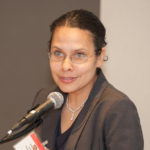By MICHELLE FAUL
Associated Press
LAGOS, Nigeria (AP) _ Nigeria‘s military is recommending immediate trial for 500 suspected extremist militants and the president is promising an economic boost for the northeast region confronting an Islamic uprising _ both issues that address concerns expressed by the United States.
The suspects include military and paramilitary personnel accused of aiding the Islamic extremist group Boko Haram that the United States last month declared a terrorist organization.
Wednesday’s developments come the week the U.S. assistant secretary of state for African affairs is in Nigeria for security meetings including officials from the U.S. Department of Defense, the U.S. Africa Command and USAID.
They come after Islamic militants scored a major success Monday in attacks on an air force base and artillery barracks just outside the northeast provincial capital Maiduguri, raising more doubts about the military’s ability to put down the insurgency.
Charred bodies, burned out wrecks of aircraft, military buildings, vehicles, and roads littered with shells bore testament Wednesday to the ferocity of the battle that witnesses said had the insurgents “practically walking all over the (air force) base” and brought soldiers to flee the artillery barracks.
Nigerian security forces have been accused of massive human rights abuses in responding to the Islamic uprising with draconian powers under a 6-month-old state of emergency _ abuses that some fear could win support for the extremists who say strict Islamic Shariah law would end the corruption endemic in Nigeria‘s government and society.
Hundreds of detainees have died in detention _ from starvation, asphyxiation in grossly overcrowded cells, from wounds from torture and in outright executions, according to Amnesty International and an Associated Press investigation of mortuary records at Maiduguri’s main hospital.
The United States, which gives military aid to Nigeria, has repeatedly raised the alleged abuses with Nigerian officials, including in a meeting between President Barack Obama and President Goodluck Jonathan on the sidelines of the United Nations general assembly earlier this year.
On previous visits, U.S. Assistant Secretary Linda Thomas-Greenfield has called for detainees to be charged and brought to court.
On Wednesday, an investigative team set up by Nigeria‘s Defense Headquarters issued a report recommending immediate trial for 500 detainees among nearly 1,400 screened at detention facilities in the region under a state of emergency.
The detainees include “high-profile suspects” who allegedly trained terrorists in weapons handling as well as insurgents trained in Mali and other countries “for the purpose of perpetuating terror in Nigeria,” according to a statement from Defense spokesman Brig. Gen. Chris Olokulade.
Among the suspects are “a medical doctor, paramilitary or (military) service personnel who were fighting on the side of the terrorists” or offered logistical support to them.
The team has recommended the release of 167 detainees, Olukolade said.
On Tuesday, after an hours-long emergency meeting with defense officials about the Maiduguri attack, Jonathan announced an “intervention program specifically targeted at accelerating the pace of socio-economic development in the northeast geopolitical zone.”
However, he warned that such a program could not be successfully implemented until peace and security are restored.
The Islamic uprising poses the greatest threat in years to the security and cohesion of Africa’s largest oil producer and most populous nation of more than 160 million people roughly divided between Christians and Muslims.
Northeast Nigeria is the country’s poorest region with the worst health and education statistics _ factors that make the rebellion attractive for some of the hundreds of thousands of unemployed young people.
Thomas-Greenfield, the U.S. official, is holding meetings this week in Abuja, Nigeria‘s capital, and then will travel to Kano, the biggest city in the Muslim-dominated north, to meet with government, business and civil society representatives, the U.S. State Department said.
Kano is not under a state of emergency but has suffered attacks by Boko Haram, most recently multiple bombings in July that killed 27 in the city’s minority Christian quarter. A shootout in Kano in November killed five suspected Islamist extremists and two soldiers.









